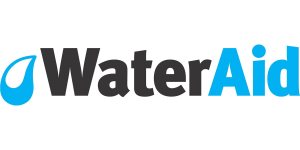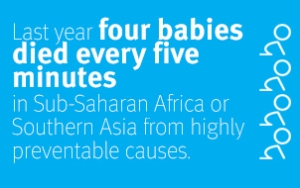21 March 2015, Abuja, Nigeria – As part of activities commemorating the 2015 World Water Day, WaterAid has launched its new four-year “Healthy Start” campaign showing the devastating impact that a lack of safe water and sanitation has on the health of children in developing countries.
Released this week, the briefing “Healthy Start: the first month of life” show that annually nearly half a million babies die in the first month of life because they are born into unhygienic conditions and one in five deaths of newborn babies in the developing world are caused by infections strongly linked to dirty water or unhygienic conditions. In Nigeria, nearly 52,000 newborn babies died from sepsis, tetanus and other infections linked to dirty water and lack of hygiene in 2013 alone.
The campaign launches as a recently released World Health Organization report reveals that nearly half of hospitals and clinics in Africa do not have access to clean water. And of the 58% of healthcare facilities that have some access, only half are able to count on a safe and reliable supply of clean water.
The World Health Organization report “Water, sanitation and hygiene in health care facilities: status in low and middle income countries and way forward” shows that across 18 countries in Sub-Saharan Africa, access to water in healthcare facilities is as low as 20%. It is the first survey of its kind and shows that in the 54 developing countries studied, 38% of healthcare facilities do not have clean water and 19% do not have safe toilets. Over a third (35%) of hospitals and clinics did not have anywhere for staff or patients to wash their hands with soap.
It has been shown that a baby’s chances of dying in the first month of life is cut by half if a mother and her birth attendant both wash their hands before handling the baby. Yet, in Nigeria almost a third (29%) of hospitals and clinics did not have access to clean water and the same percentage did not have safe toilets. The WHO report also showed that one in six (16%) did not have anywhere to wash hands with soap.
Tragically for one in five babies who die in their first month in the developing world, just being washed in clean water and cared for in a clean environment by people who had washed their hands could have prevented their untimely deaths. In Nigeria one woman in every 23 will on average lose a baby to infection during her lifetime compared to one in 7,518 in the UK.
The WaterAid briefing highlights the risks presented to babies by healthcare facilities that do not offer a hygienic birth environment. It outlines measures needed to ensure that every healthcare facility has clean running water, safe toilets and sinks with soap available to staff and patients.
The goal for “Healthy Start” is that decision leaders and policy makers ensure that survival rates and health outcomes are improved for children by integrating water, sanitation and hygiene within their policies, activities and rhetoric. In particular our aim is that the health sector joins with the water and sanitation sector in delivering water, sanitation and hygiene for all by 2030 as an essential requirement for increasing the numbers of children who have healthy childhoods, better prospects for healthy lives and for leaving poverty behind.
Dr. Michael Ojo, WaterAid Nigeria’s Country Representative said:
“The links between dirty hands, dirty water and infant mortality have been known for over 150 years.
“Being born into unhygienic conditions condemns too many babies in the Nigeria and the developing world to a tragically early and avoidable death and their parents to needless heartbreak. Tragically for these one in five babies who die in their first month in the developing world, just being washed in clean water and cared for in a clean environment by people who had washed their hands could have prevented their untimely deaths. The fact that we know what the solution is makes this an injustice waiting for action.
“The ability to keep a hospital or clinic clean is such a fundamental basic requirement of health care that you have to question whether a facility without clean running water or basic sanitation can adequately serve its patients.
“We want the global community to commit to ensuring everyone has access to safe water and sanitation by 2030 – which is an ambitious target but an achievable target. But within that commitment, we want to see healthcare facilities prioritised – no new hospitals or clinics should be built without water and sanitation.
“There must be individual and collective responsibility for ensuring hygienic conditions in health centres. We need everyone involved in leading and shaping health services to work together to ensure that the most vulnerable members of society do not have their life expectancy reduced to mere weeks because facilities are unable to meet the most basic standards of clean and safe care.”
Our children are dying needlessly. Diarrhoea is the second biggest child killer in Nigeria and nearly 100,000 children under the age of five die of diarrhoea in Nigeria every year as a result of the nation’s poor levels of access to water and sanitation. Sub-Saharan Africa ranks lowest in the world for access to improved drinking water and sanitation. This is invariably linked to the region’s under-five mortality rate which is one of the highest in the world.
The global theme for World Water Day this year is ‘Water and Sustainable Development’. The year 2015 provides an important opportunity to consolidate and build upon previous World Water Days to highlight water’s role in the sustainable development agenda. It is also an important year for development at a global scale and it gives us the opportunity to integrate our efforts and get involved in influencing the outcomes of global debates that could achieve: an end to poverty in all its forms; the meeting of fundamental rights, tackling inequality and discrimination; an accelerated transition to 100% renewable energy; and a world where everyone can participate and hold their leaders accountable.
World Water Day is a United Nations designated global day for action to illustrate the importance of water in our lives. In 2010, the UN General Assembly adopted a resolution recognising the human right to water and sanitation as “essential for the full enjoyment of the right to life”. Although the rights to water and sanitation have been ratified by the Nigerian Government, these rights are not recognised in any legal framework of the country such as the Constitution.
Access to water and sanitation are fundamental human rights and yet 748 million (about 1 in 10 people) in the world do not have access and 2.5 billion (1 in 3 people) lack access to sanitation. In Nigeria, over 60 million people (36% of the population) lack access to improved water sources and over 120 million (72% of the population) lack access to basic sanitation.
The lack of access to safe water, basic sanitation and hygiene harms the health of children and often leaves a lifetime legacy of disease and poverty. Where clean water, sanitation and good hygiene are lacking, improvements in health and nutrition aren’t sustainable. The costs of this are high in terms of ill health, deaths and economic losses. All sustainable development is made impossible without clean water and access to sanitation and hygiene facilities.
The United Nations is currently deciding on the Sustainable Development Goals, which will be successors to the Millennium Development Goals. WaterAid is calling for a dedicated goal to deliver water and sanitation to everyone, everywhere by 2030, including in all healthcare facilities.
For more information or to arrange interviews please contact Oluseyi Abdulmalik, WaterAid Nigeria’s Communications & Campaigns Manager, on OluseyiAbdulmalik@wateraid.org or +234 (0)808 566 1602,



